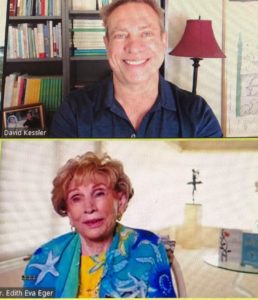Dr. Edith Eger on Love, Suffering, and Liberation.

How do you rebuild your life after the unimaginable? This week, David is speaking with Dr. Edith Eger, a psychologist, best-selling author, and Holocaust survivor with depths of wisdom to share. Our experiences of grief can be surprising, and the feelings it stirs up can be disorienting. Where do we begin in the process of facing reality? What are the side effects of denying our emotions? How can we regard ourselves, and our wounds, in the aftermath? Dr. Eger is a generous storyteller with powerful insights. Her latest book is “The Gift: 14 Lessons to Save Your Life.”

A native of Hungary, Edith Eva Eger was just a teenager in 1944 when she experienced one of the worst evils the human race has ever known. As a Jew living in Nazi-occupied Eastern Europe, she and her family were sent to Auschwitz, the heinous death camp. Her parents were sent to the gas chambers but Edith’s bravery kept her and her sister alive.
Dr. Eger is a prolific author and a member of several professional associations. She has a clinical practice in La Jolla, California and holds a faculty appointment at the University of California, San Diego. She has appeared on numerous television programs including CNN and the Oprah Winfrey Show; and was the primary subject of a holocaust documentary that appeared on Dutch National Television. She is frequently invited to speaking engagements throughout the United States and abroad.
One of our the blocks between us and our healing is often what has happened to us. Loss and bad things occur in the world, they happen to all of us, they impact us and they can easily become our identity. How can we find ourselves and our place in the world after the worst things in the world happen to us?
Join me in this conversation with Dr. Edith Eger. She is a psychologist who has been practicing for over 40 years. She is a holocaust survivor. At 16 years old, she and her family were sent to a concentration camp. She never saw her parents again. In her early years, she survived some of the worst atrocities imaginable and has helped so many in her long career as a psychologist, speaker, and author.
When we are in grief we are thrown into a dark room, a dark night and we are searching for the switch to turn on the light. Others from the outside of the room may ask us to turn on the light. But, of course, it’s not that simple.
Join us in this powerful conversation as Dr. Eger shares her wisdom, resilience, and courage and encourages us to feel our feelings and embody our strength.
www.tenderheartssupport.com - David's online grief support group, Tender Hearts
www.aboutgrief.com - Understanding loss and grief
www.lossofaparent.com - Death of a parent
www.parentforever.com - Death of a child and sibling
www.griefsuicide.com - Death of a loved one by suicide
988lifeline.org - 988 Suicide & Crisis Lifeline
nami.org - National Alliance of Mental Illness
afsp.org - American Foundation of Suicide Prevention
adultchildren.org - Adult Children of Alcoholics® & Dysfunctional Families
al-anon.org - Al-Anon Family Groups
amzn.to/31AZCPv - Finding Meaning: The Sixth Stage of Grief
actapublications.com/tear-soup - Tear Soup: A Recipe of Healing After Loss
www.elf-help.com/grief_therapy_124048.htm - Grief Therapy, Elf Help Books
Hearing Dr. Eger’s perceptive on life at 94 can give us all hope and strength on how deep our healing can be. She is still working with trauma survivors that can help with grief and trauma and find healing.
You can’t heal what you don’t feel
Dr. Eger shares, “The opposite of depression is expression. What comes out of us doesn’t make us sick; what stays in does.” We need to feel our feelings. Remember that no feeling lasts forever. How can we let our feelings out for our own healing?
We are not victims – we were victimized
Some of us were victimized by a person or by life. Bad things happen to many of us. But they don’t need to become our identity. Dr. Eger suggested that we write two letters that are just for ourselves and we would not send. In the first letter, write down all the things you’re angry about. In the second letter write all of the things that you appreciate and how you have become stronger through suffering. We are not victims, we were victimized.
Are you evolving or revolving?
Where are you stuck? Where do revolve and how could you interrupt that pattern?
Escaping the prisons of our own minds
Where are you imprisoning yourself? It can be the things you say in your mind all the time. What beliefs and patterns do you repeat?
Transform your traumatic wound into your cherished wound
How would your grief and trauma change if your traumatic wound eventually become your cherished wound? Grieving and feeling and healing is what we can do today to come into our strength and power.
Licensed Professional Counselors – Get listed on Grief.com

